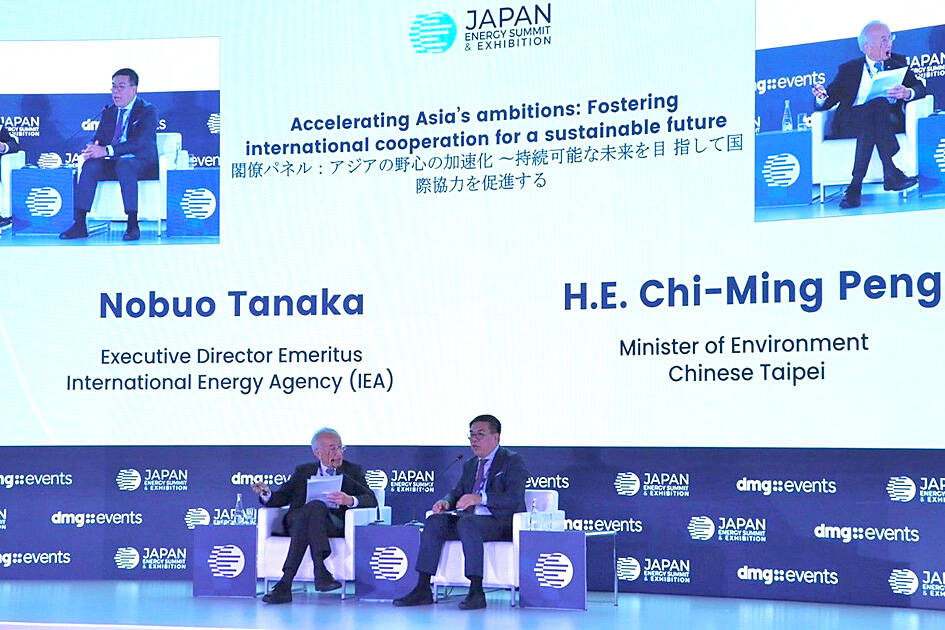By Esme Yeh / Staff reporter
Minister of Environment Peng Chi-ming (彭啟明) on Wednesday updated international energy and climate leaders on Taiwan’s latest climate and carbon reduction policies during the Japan Energy Summit in Tokyo.
Taiwan has set a contribution target of reducing carbon emissions by 36 to 40 percent by 2035, with 2005 as the baseline year, the second-most ambitious target among Asian countries, behind only Japan, Peng said during a panel discussion with International Energy Agency executive director emeritus Nobuo Tanaka.
While the No. 2 reactor at the Ma-anshan Nuclear Power Plant in Pingtung County was decommissioned on May 17, Taiwan has maintained stable power supply while steadily driving the sustainable energy transition, Peng said.

Photo courtesy of the Ministry of Environment
Taiwan would adopt an open yet wary attitude toward emerging energy sources amid the global energy transition, and take a cautious approach to existing energy facilities, he said.
He also cited President William Lai (賴清德) as saying during his presidential inaugural anniversary address on May 20 that Taiwan’s nuclear policy would be cautiously implemented based on “two musts” and “three principles.”
The “two musts” refer to two procedural requirements: the Nuclear Safety Commission must establish legitimate procedures for evaluating the safety of nuclear power plants and Taiwan Power Co must conduct safety inspections in accordance with those procedures to assess the costs and feasibility of restarting a nuclear power plant.
Before nuclear facilities are turned on, they must meet “three principles”: nuclear safety has been ensured, the nuclear waste issue has been resolved and societal consensus has been reached.
Taiwan has entered the era of carbon pricing and would progress toward a dual-track carbon reduction mechanism that combines carbon fees with an emissions trading system, Peng said, adding that it would begin on a trial basis from the second half of next year and run until 2028.
The carbon fee system is based on the characteristics of different industries and implements a scheme of self-determined emissions reduction plans to guide companies in their green transitions, in line with international regulations, he said, calling on Asian countries to initiate collaborations in building a regional carbon reduction market.
Taiwan has been developing multiple net zero techniques, solar power, offshore wind power, geothermal energy, hydrogen, methane pyrolysis, energy storage technology, and carbon capture, utilization and storage, Peng said.
Different energy sources present different opportunities and challenges, he said, adding that he expected to expedite Taiwan’s green energy developments and decarbonization process through exchanges with international partners.
Although carbon tariffs and volatile climate policies pose a challenge to many countries, Taiwan would be consistent with its net zero commitments and continue to adjust its strategies to ensure steady energy transition, Peng said.
Additional reporting by Chen Yu-fu

AloJapan.com